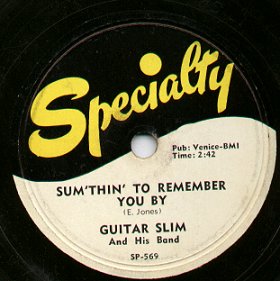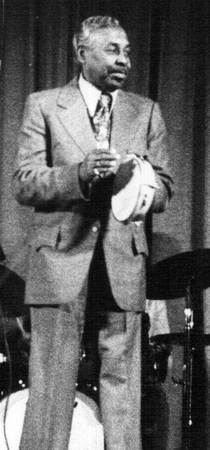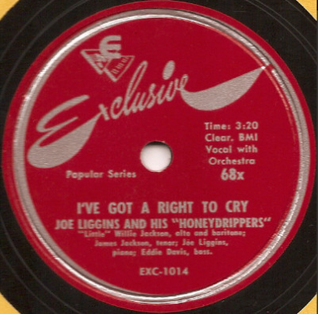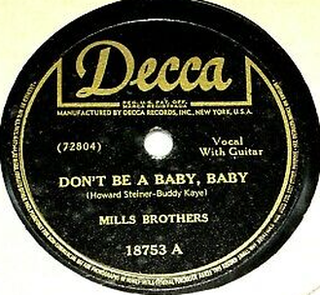
Specialty Records was an American record label founded in Los Angeles in 1945 by Art Rupe. It was known for rhythm and blues, gospel, and early rock and roll, and recorded artists such as Little Richard, Guitar Slim, Percy Mayfield, and Lloyd Price. Rupe established the company under the name Juke Box Records but changed it to Specialty in 1946 when he parted company with a couple of his original partners. Rupe's daughter, Beverly, restarted the label in the 1980s.

Camille Howard was an American rhythm and blues pianist and singer, who first came to prominence in Roy Milton's Solid Senders in the 1940s. Her most successful recordings included "R. M. Blues", "Thrill Me", and her own "X-Temporaneous Boogie" (1948).

Roy Bunny Milton was an American R&B and jump blues singer, drummer and bandleader.

"Don't Worry 'Bout That Mule" is a song attributed to Charles Stewart, William Davis, Duke Groaner, and Fleecie Moore. It was performed by Louis Jordan and his Tympany Five, recorded in July 1945, and released on the Decca label.

"Texas and Pacific" is a song written by Jack Wolf Fine and Joseph E. Hirsch. It was performed by Louis Jordan and his Tympany Five, recorded in October 1946, and released on the Decca label. The song describes a rider's experience on the Texas & Pacific Railway. The "B" side of the record was "I Like 'Em Fat Like That".

"Jack, You're Dead" is a song written by Dick Miles and Walter Bishop. It was performed by Louis Jordan and his Tympany Five, recorded in October 1946, and released on the Decca label. The song describes a man's physical state if he fails to respond to romance.

"No More Doggin'" is a rhythm and blues song written and originally recorded by blues musician Rosco Gordon in 1952. The song featured Gordon's signature "Rosco Rhythm" piano style which became a precursor to Jamaican ska music.

"Salt Pork, West Virginia" is a song attributed to Fleecie Moore and William J. Tennyson Jr., performed by Louis Jordan and his Tympany Five, and released on the Decca label. It peaked at No. 2 on Billboard's race record chart and remained on the chart for 15 weeks. It ranked No. 8 on the magazine's list of the most played race records of 1946.

"I've Got a Right to Cry" is a song written by Joe Liggins.

"Don't Be a Baby, Baby" is a song written by Howard Steiner and Buddy Kaye, performed by The Mills Brothers, and released on the Decca label. It peaked at No. 3 on Billboard magazine's race records chart and spent eight weeks on that chart. It also reached No. 12 on the pop chart. It was ranked No. 15 on the Billboard's year-end list of the most played race records of 1946.

"Beware" is a song attributed to Morry Lasco, Dick Adams, and Fleecie Moore. It was performed by Louis Jordan and his Tympany Five, recorded in January 1946, and released on the Decca label.

"That Chick's Too Young to Fry" is a song written by Tommy Edwards and Jimmy Hilliard. It was performed by Louis Jordan and his Tympany Five, recorded in January 1946, and released on the Decca label. The record's "B" side was "Choo Choo Ch'Boogie".

"Reconversion Blues" is a song attributed to Steve Graham and Fleecie Moore. It was performed by Louis Jordan and his Tympany Five, recorded in October 1946, and released on the Decca label. The record's "B" side was "Salt Pork, West Virginia".

"New Orleans Blues" is a song written by Leon René and performed by Johnny Moore's Three Blazers, consisting of Charles Brown on vocals and piano, Johnny Moore on guitar, and Eddie Williams on bass. The record which was released in 1947 on the Exclusive label. It debuted on Billboard magazine's race records chart on June 28, 1947, peaked at No. 2, and remained on the chart for 13 weeks. It was ranked No. 11 on the Billboard's year-end list of the most played race records of 1947.
Little Walter (1930–1968) was an American blues artist who is generally regarded as the most influential blues harmonica player of his era. Most of his earliest recordings were as a sideman, when he contributed harmonica to songs by Chicago blues musicians such as Jimmy Rogers and Muddy Waters. As the featured artist, he recorded the instrumental "Juke" in 1952. The single reached number one on the Billboard Rhythm and Blues chart and launched his career as a solo artist.














